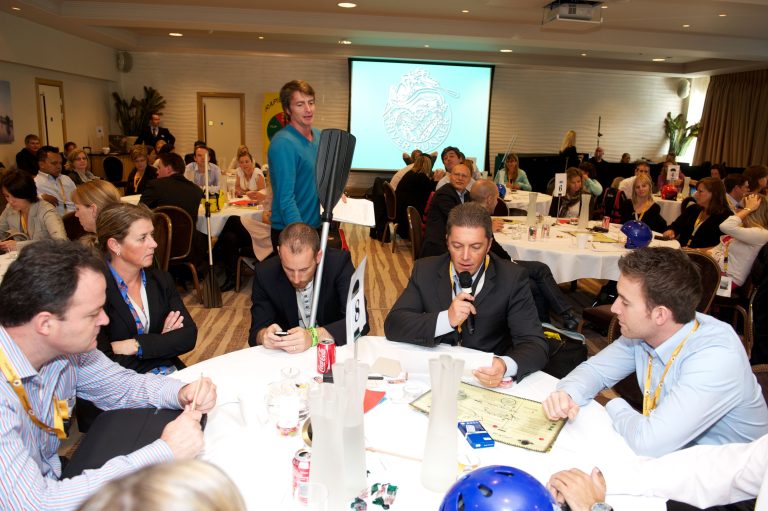Introduction
In today's fast-paced corporate world, effective teamwork is crucial for the success of any organization. One of the best ways to improve team dynamics and foster a sense of collaboration among employees is through team-building activities. While traditional team-building exercises like trust falls and group problem-solving are still popular, adventure-based team-building activities are gaining popularity due to their ability to promote teamwork in a unique and exciting way. In this blog, we will discuss the benefits of adventure-based team-building activities and offer ideas for companies to incorporate them into their team-building programs.
The Benefits of Adventure-Based Team-Building Activities
Adventure-based team-building activities typically involve physical challenges or outdoor adventures such as rock climbing, zip lining, or white-water rafting. These activities require teamwork, trust, and effective communication to complete successfully. One of the main benefits of adventure-based team-building activities is that they push employees out of their comfort zones, promoting personal growth and self-confidence. As employees work together to overcome physical challenges, they develop a sense of trust and collaboration, which translates into better working relationships and improved productivity in the workplace.

Another benefit of adventure-based team-building activities is that they provide a break from the monotony of the office environment. By engaging in physically challenging activities, employees have the opportunity to release stress and rejuvenate their minds and bodies. This can lead to increased focus and creativity when they return to their work tasks.
Adventure-based team-building activities can also help to build leadership skills. Employees are often placed in situations where they need to make quick decisions and take charge, which can help to develop leadership qualities such as confidence, adaptability, and communication skills.
Now that we have discussed the benefits of adventure-based team-building activities, let's explore some ideas for companies to incorporate into their team-building programs.
- Outdoor Adventure Retreats: Consider planning a weekend retreat for employees that involves outdoor adventure activities such as hiking, camping, and zip lining. This provides an opportunity for employees to bond and develop relationships outside of the office environment.
- Physical Challenges: Set up physical challenges such as obstacle courses or rock climbing walls at the office or nearby park. This encourages employees to work together and provides a fun break from their usual work routine.
- Charity Challenge Events: Participate in charity challenge events such as a fun run or bike race, and encourage employees to work together to raise money for the chosen charity. This not only promotes teamwork but also gives back to the community.
- Adventure Scavenger Hunt: Create a scavenger hunt that involves physically challenging tasks such as rappelling or kayaking to reach the next clue. This promotes teamwork and problem-solving skills while adding an element of adventure to the activity.
- Survival Training: Consider organizing a survival training course that involves learning skills such as building a shelter, starting a fire, and foraging for food. This provides a unique and challenging experience that encourages teamwork and leadership skills.
Incorporating adventure-based team-building activities into your team-building program can have a positive impact on your organization. These activities promote personal growth, team bonding, and leadership development. They also provide a break from the monotony of the office environment and can lead to increased productivity and creativity. By incorporating these ideas into your team building program, you can improve teamwork and collaboration among your employees, leading to a more successful and productive workplace.
Another benefit of adventure-based team-building activities is that they can help build trust among team members. Trust is a crucial component of any successful team, as it allows team members to rely on one another and work together effectively. When participating in activities such as trust falls, high ropes courses, or rock climbing, team members are forced to rely on each other and trust that their teammates have their best interests at heart. Through these experiences, team members can develop a deeper level of trust and respect for one another, which can translate into better communication, collaboration, and overall performance in the workplace.
Additionally, adventure-based team-building activities can help improve problem-solving skills. Many of these activities require team members to work together to solve complex problems, such as finding a way to navigate through a maze or completing a ropes course. These activities can help team members develop critical thinking and problem-solving skills, which can be invaluable in the workplace. By working together to solve problems, team members can also learn how to communicate effectively and leverage each other's strengths to achieve a common goal.
So, what are some adventure-based team-building activities that companies can incorporate into their programs? One option is a high ropes course, which typically involves a series of elevated obstacles that team members must navigate through while secured by safety harnesses. This activity requires a high level of trust and communication among team members, as well as problem-solving and decision-making skills.
Another option is rock climbing, which can be done indoors or outdoors. Like a high ropes course, rock climbing requires a high level of trust and communication among team members, as well as physical and mental strength. Team members must work together to climb the rock face and belay each other to ensure everyone's safety.
Team-building scavenger hunts can also be a fun and engaging adventure-based activity. Teams must work together to solve clues and complete challenges, which can include physical activities like kayaking or hiking or mental challenges like puzzles or riddles. This activity promotes teamwork, communication, and problem-solving skills, as well as encourages participants to think outside the box.
Conclusion
Adventure-based team-building activities can provide a fun and engaging way for companies to build stronger teams. By promoting communication, trust, problem-solving skills, and a sense of camaraderie, these activities can improve overall team performance and help create a more positive and collaborative workplace environment. Companies should consider incorporating adventure-based team-building activities into their programs to help employees build stronger relationships and improve their overall performance.






